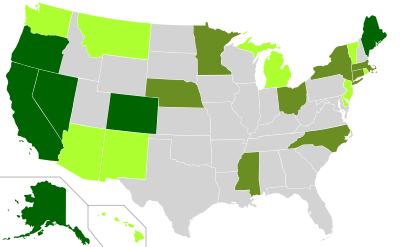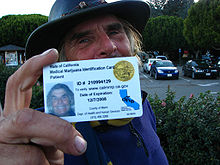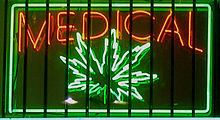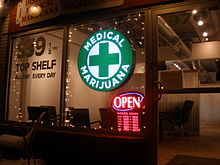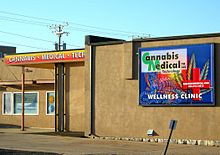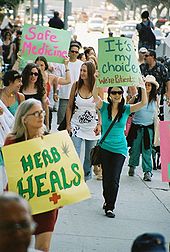- Medical cannabis in the United States
-
In the United States, there are important legal differences between medical cannabis at the federal and state levels. At the federal level, cannabis per se has been made criminal by implementation of the Controlled Substances Act but as of 2009, new federal guidelines have been enacted. According to U.S. Attorney General Eric Holder, "It will not be a priority to use federal resources to prosecute patients with serious illnesses or their caregivers who are complying with state laws on medical marijuana, but we will not tolerate drug traffickers who hide behind claims of compliance with state law to mask activities that are clearly illegal."[1][2][3] A January 2010 ABC news poll showed that 81 percent of Americans believed that medical cannabis should be legal in the United States.[4]
Contents
Overview
The Federal Food, Drug, and Cosmetic Act makes the U.S. Food and Drug Administration (FDA) the sole government entity responsible for ensuring the safety and efficacy of new prescription and over-the-counter drugs, overseeing the labeling and marketing of drugs, and regulating the manufacturing and packaging of drugs.[5] The FDA defines a drug as safe and effective for a specific indication if the clinical benefits to the patient are felt to outweigh any health risks the drug might pose. The FDA and comparable authorities in Western Europe including the Netherlands, have not approved smoked cannabis (some because of the problems related to smoking per se) for any condition or disease.[6][7] Cannabis remains illegal throughout the United States and is not approved for prescription as medicine, although 16 states - Alaska, Arizona, California, Colorado, Delaware, Hawaii, New Jersey, Maine, Michigan, Montana, Nevada, New Mexico, Oregon, Rhode Island, Vermont, and Washington - as well as the District of Columbia approve and regulate its medical use. The Federal government continues to enforce its prohibition in these states. However, there is also one state, Maryland, whose drug laws are favorable towards the medicinal use of cannabis, making it a non-incarcerable offense with a maximum penalty of a $100 fine,[8] but which still explicitly bans it. Most recently, in the 2010 election Arizona passed a referendum permitting the use of cannabis for medical purposes, and on May 13, 2011, Delaware became the 16th state to legalize medical cannabis after Governor Jack Markell signed medical marijuana legislation into law.
Potential health benefits aside, cannabis remains a U.S. federally controlled substance, making possession and distribution illegal. It has been estimated that an average marijuana clinic distributes a pound of cannabis per day,[citation needed] making acquisition a critical challenge. This acquisition may have to resort to more traditionally crime-associated, black-market sources, contributing to crime in communities. This point was illustrated in early 2007, with the murder of Denver, Colorado area medical cannabis activist Ken Gorman.[9]
Researchers face similar challenges in obtaining medical cannabis for research trial. Recently, the FDA has approved a number of cannabis research clinical trials, but the Drug Enforcement Agency has not granted licenses to the researchers in these studies.
Cannabis was listed in the United States Pharmacopeia from 1850 until 1942.[10] The United States Federal government does not currently recognize any legitimate medical use, although there are currently five patients receiving cannabis for their various illnesses through the Compassionate Investigational New Drug program that was closed to new patients in 1991 by the George H. W. Bush administration. Francis L. Young, an administrative law judge with the United States Drug Enforcement Agency, in 1988, declared that "in its natural form, [cannabis] is one of the safest therapeutically active substances known."[11] Fifteen U.S. state laws, as well as the District of Columbia, currently allow for the medicinal use of cannabis,[citation needed] but the United States Supreme Court ruled that the Federal government has the right to regulate and criminalize cannabis also in these states, even for medical purposes.
The term "medical marijuana" post-dates the U.S. Marijuana Tax Act of 1937, enacted by the Franklin D. Roosevelt administration, the effect of which made cannabis prescriptions illegal in the United States.
Since the creation of the DEA, the agency has spent over 100 Billion dollars trying stop the flow of illegal drugs into the United States. States that have legalized marijuana have seen an increase in revenue though taxation. For example in 2008, the state of Hawaii made over 10 million dollars through taxation of medical marijuana. [12]
In many states that have medical marijuana laws, there has been an increase in crime around marijuana dispensaries. In most cases the number of muggings has gone up and that police encounter an increased number of drug dealers. Opponents of medical marijuana have attempted to use this against future legalization efforts, claiming that there is a correlation between drug use and crime. However, most of this criminal behavior is a result of the culture surrounding marijuana and people looking to use the substance for non-medical reasons. [13]
Comparisons to alcohol prohibition
In an essay entitled Physicians Are Not Bootleggers, bioethicist Jacob Appel compared the medicinal cannabis movement to the medicinal alcohol movement that took place during the Prohibition era of the 1920s in the United States. Just as modern physicians who want the right to prescribe cannabis may or may not support its legalization for use without a prescription, the essay notes that physicians in the 1920s who wanted the right to prescribe alcohol were not uniformly in favor of repealing Prohibition. They were united instead by their opposition to what they saw as unwarranted governmental interference in the practice of medicine.[14]
Medical cannabis by state
Alaska
The medical use of cannabis was endorsed by 58% of voters in Alaska in November 1998 and the law became effective on March 4, 1999. The law legalizes the possession, cultivation and use of cannabis for patients who have received a certificate from a doctor confirming they can benefit from the medical use of cannabis. The conditions and symptoms eligible are: cachexia, cancer, chronic pain, epilepsy and other conditions characterized by spasms, chronic glaucoma, HIV or AIDS, multiple sclerosis and nausea. The state maintains a confidential list of patients who are assigned an identity card.[15]
Arizona
Arizona's proposition 203, also called "Arizona Medical Marijuana Act", was a measure to legalize the use of medical cannabis[16] and appeared on the general election ballot via a citizen petition.[17] The initiative will allow patients with a "debilitating medical condition" to possess up to 2.5 ounces of marijuana every two weeks with a doctor's recommendation. They will also be able to cultivate no more than twelve cannabis plants only if they do not live within twenty-five miles of a state licensed dispensary. Arizona has allocated the licensing of dispensaries at a ratio of one per ten pharmacies in the state, or a total of 124. The outcome of Prop. 203 was not announced until Sunday, November 14, 2010 when it passed by 4,300 votes.[18] Information about medical marijuana law in Arizona is available at www.azmarijuana.com.
California
See also: California Proposition 215 (1996), California Assembly Bill 390, and Tax, Regulate, and Control Cannabis Act (2010)Information about medical cannabis in the state of California can be found here: [1]. In 1996 California voted Proposition 215, also called the Compassionate Use Act, into law. CA Senate Bill 420 was passed in 2003 to clarify Proposition 215 by specifying statewide minimum limits on possession of cannabis and enact a Statewide Medical Cannabis ID Card Program (the G214 card). As of January 16, 2008, only 36 of 58 counties are issuing cards in the program, with 18,847 cards having been issued,[19] however, participation in the ID Card program is optional and the identification card is not required to claim the Act's protections.[20]
On November 5, 1996 56% of voters approved Proposition 215. The law removes state-level criminal penalties on the use, possession, and cultivation of cannabis by patients who possess a "written or oral recommendation" from their physician that he/she "would benefit from medical cannabis." Patients diagnosed with any illness where the medical use of cannabis has been "deemed appropriate and has been recommended by a physician" are provided with legal protection under this act. Conditions typically covered by the law include: arthritis; cachexia; cancer; chronic pain; HIV or AIDS; epilepsy; migraine; and multiple sclerosis, with other less debilitating conditions like insomnia, reduced appetite, anxiety, and PTSD often treated also. No regulations regarding the amount of cannabis patients may possess and/or cultivate were provided by this act, though the California Legislature adopted guidelines in 2003.[21]
"Across California there are an estimated 2,100 dispensaries, co-operatives, wellness clinics, and taxi delivery services in the sector known as “cannabusiness”. That is more than all the Starbucks, McDonald’s, and 7-Eleven outlets in the state put together."[22]
Colorado
On November 7, 2000, 54% of Colorado voters passed Amendment 20, which amends the Colorado State constitution to allow the medical use of cannabis.[15] Patients can possess no more than 2 oz. (almost 57 g) of "usable cannabis" and not more than 6 cannabis plants, and they may neither take their medicine in public, nor even on their own property, if the public can see them taking it.[15]
In November 2009, in Breckenridge, Colorado, 70% of voters elected to amend the town code to remove all criminal and civil penalties, including fines, on the private possession of up to one ounce of marijuana. More than 70% of local voters had voted yes on a similar, but unsuccessful, statewide measure in 2005.
In December of 2010, CNBC aired a one hour special titled Marijuana USA that focused on the tremendous growth of the legal cannabis trade in Colorado as marijuana emerges from the black market to the mainstream market. [23] Additional information about medical cannabis in Colorado can be found here:.[24]
Delaware
On May 13, 2011, Delaware became the 16th state to legalize medical cannabis after Governor Jack Markell signed the bill. The bill has passed the state senate on May 11 by a 17-4 vote. Patients who certify they have a serious medical condition are allowed to possess up to six ounces, or 170 grams, of cannabis. State-licensed centers are allowed to grow the marijuana and dispense it to patients 18 and older.[25] Information about medical marijuana law in Delaware is available at www.delawarechronic.com.
Hawaii
In Hawaii, Senate Bill 862 became law on June 14, 2000. Patients can possess a maximum of 3 ounces (84g) of usable cannabis and a maximum of 8 cannabis plants.[15] Information about medical cannabis in Hawaii is available at: [2].[15]
Iowa
Iowa law gives control of marijuana policy to the Iowa Pharmacy Board and not to elected law makers. On November 2, 2010, the Iowa Board of Pharmacy declared marijuana to be a schedule two drug. What that classification means is that marijuana is a drug with potential benefits, but a high risk of misuse. The Iowa Board of Pharmacy refused to create any set of rules or regulations regarding medical marijuana usage, claiming that it should be elected Iowa officials that handle such issues. There is currently no medical marijuana system set up in Iowa, but the Iowa Board of Pharmacy retains the power to create it if they so desired. [26]
Maine
On November 2, 1999, 62% of voters in Maine passed Question 2. Patients or their primary physicians could possess a maximum of 1 1/4 ounces (35 g) of usable cannabis and a maximum of 6 plants. The law was amended when Maine Senate Bill 611 was signed into law on April 2, 2002, increasing the maximum quantity of usable cannabis a patient is allowed to possess to 2 1/2 ounces.[15] Information about medical cannabis in Maine is available at www.mainecommonsense.org.
November 2009 Maine voters approved Question 5, the Maine Marijuana Medical Act. The measure amends existing state law by: establishing a confidential patient registry, expanding the list of qualifying conditions for which a physician may recommend medicinal cannabis, and by allowing for the creation of non-profit state-licensed dispensaries to assist in the distribution of medical cannabis to qualified patients.
Maryland
The legislature of Maryland passed a "medical marijuana affirmative defense law" in the year 2003[27], and amended it May 10th 2011[28][27]. If someone is being prosecuted by the state for certain marijuana related crimes, then the court is required by law to consider a defendant's "medical necessity."[27][28] If medical necessity is proven, possession up to one ounce carries no penalty - higher possession and cultivation may then only be fined $100.[27][28]
Michigan
On November 4, 2008, Michigan voters passed a measure allowing the use of medicinal cannabis for patients with debilitating medical conditions (including cancer, multiple sclerosis and HIV). The measure also required Michigan's health department to create a registry of qualified patients. Growing cannabis was also approved, for registered individuals using secure facilities.[29] The mandate also introduced a medical necessity defense clause for persons without a card or who use cannabis to treat ailments not covered by the law.
Montana
On November 2, 2004, voters of Montana passed Initiative 148, which took effect immediately.[15] It eliminated criminal sanctions for medical cannabis authorized by a patient's physician.[15] Possession of as many as six cannabis plants is allowed.[15] More information on medical cannabis in Montana is available here:.[30]
Nevada
On November 7, 2000 voters in Nevada passed Question 9, amending the state constitution to sanction medical cannabis.[15] The law provides that patients may possess a maximum of 1 ounce (28 g) of usable cannabis and grow a maximum of 7 cannabis plants.[15]
New Jersey
On January 11, 2010, the New Jersey legislature approved a measure legalizing medical cannabis for patients with severe chronic illnesses, the New Jersey Compassionate Use Medical Marijuana Act.[31] Governor Corzine signed the bill into law on January 18.[32]
New Mexico
On April 2, 2007 the governor of New Mexico approved Senate Bill 523, which legalizes medical cannabis for patients authorized by the state.[15] More information can be found at: [3].
Oregon
Information about medical cannabis in Oregon can be found here:[33] The Oregon medical cannabis program has the name, "The Oregon Medical Marijuana Program," which administers the Medical Marijuana Act approved there by the public in November 1998 through Oregon Ballot Measure 67 (1998).[34] The Oregon Medical Marijuana Program administers the program within the Oregon Department of Human Services. Virtually all patients benefiting from the program suffer from severe pain and almost 2500 from nausea. The other conditions are given as epilepsy, AIDS / HIV, cancer, cachexia, chronic glaucoma and tremors caused by Alzheimer's disease.[35] As of July 1, 2011, there were 49,220 registered patients with medical cannabis cards with another 4,581 applications (including renewals) pending.[36]
Rhode Island
On January 3, 2006, The Edward O. Hawkins and Thomas C. Slater Medical Marijuana Act (Rhode Island) became law and simultaneously went into effect.[15] It legalizes medical cannabis, provided that certain conditions are met. Patients can possess a maximum of 2.5 ounces of cannabis and a maximum of 12 cannabis plants.[15]
On June 16, 2009, the Rhode Island legislature overrode a gubernatorial veto of a bill authorizing up to three medical cannabis dispensaries in the state. The House voted 68-0 for the cannabis measure and the senate followed minutes later by a 35-3 count. The new law will make Rhode Island the third state, following New Mexico and California, to allow the sale of medical cannabis. Under the new law, one dispensary will be authorized to open in 2010, to be followed by two more in 2011.[37]
More information is available at: Rhode Island Patient Advocacy Coalition and.[38]
Vermont
In Vermont, Senate Bill 76 went into effect July 1, 2004, legalizing medical cannabis, provided certain conditions are met.[15] Patients or their primary doctor are allowed to possess a maximum of 2 ounces of usable cannabis and a maximum of 3 cannabis plants, a maximum of which one can be mature.[15]
Amendments
Vermont Senate Bill 7 went into effect July 1, 2007 further defining which patients qualify for medical cannabis and how much they may possess without penalty of law at the state level.[15] The amendment allows physicians licensed outside of Vermont to recommend medical cannabis for Vermont patients.[15]
More information about medical cannabis in Vermont is available here:.[39]
Washington
The State of Washington adopted a law in November 1998 (Initiative 692), legalizing the use, possession, and cultivation of cannabis for patients with a medical certificate. The legislature amended the statute in 2007 and 2010. After June 10, 2010, the medical documentation may be issued by a physician, physician's assistant, naturopath, or advanced registered nurse practitioner; it must be on tamper-resistant paper and accompanied by photo ID. The following conditions are eligible: cachexia, cancer, HIV or AIDS, epilepsy or other seizure disorders, glaucoma unrelieved by standard drugs or treatments, chronic pain otherwise intractable, Crohn's disease with intractable symptoms, Hepatitis C with intractable nausea or pain, and multiple sclerosis. According to the law in Washington,[40] a qualified patient and the patient's designated provider may together possess not more than a 60-day supply; it is presumed in regulation that this will be not more than 24 ounces of usable marijuana and not more than 15 marijuana plants.[41]
Washington DC
A bill by the DC council was not overruled by Congress. Medical cannabis became legal on Jan. 1, 2011.[42]
Opposition and support
Notable pro-medical cannabis individuals
Supporters of legalizing cannabis for medical use range from actors and musicians to politicians, writers, and scientists. Major activists include Steve Kubby, Ethan Nadelmann, Dennis Peron, Angel Raich, Robert Randall,[43] Keith Stroup, and Marc Emery.
Politicians from multiple parties support medicinal cannabis use[44] Democratic members of Congress Barney Frank, Dennis Kucinich, Steve Cohen, and Sam Farr, Republican Congress members Ron Paul[45] and Dana Rohrabacher, Republican State Senator Bill Mescher, and Libertarian Loretta Nall.
Researchers and scientist advocates include Jay Cavanaugh, Lyle Craker, Milton Friedman, Stephen Jay Gould, Lester Grinspoon, Bob Melamede,[46] and Carl Sagan.
Writers, such as William F. Buckley, Fred Gardner, Christopher Hitchens,[47] Jack Herer, Peter McWilliams, Salman Rushdie, Ann Druyan, Ed Rosenthal, Rick Steves, Samuel Thompson, and Robert Anton Wilson also support the legalization of medical cannabis.
Musician Melissa Etheridge supports medical cannabis. On September 25, 2009 on the HBO show Real Time with Bill Maher, Former Governor of New York Elliot Spitzer expressed support for the legalization of medical cannabis.
The 2007 documentary film "Waiting to Inhale" by award winning filmmaker Jed Riffe, examines the debate over medical cannabis and has been a screened in states during medical cannabis campaigns.[48]
In 2011 the Marijuana Policy Project called on the government to allow the FDA-approved study of veterans. The California Medical Association called for legalization of marijuana on October 15, 2011, stating to the Los Angeles Times that the question of whether marijuana is a medicine "can only be answered once it is legalized and more research is done". [49]
Notable anti-medical cannabis individuals
Politicians that oppose the medicinal use of cannabis include former Drug Czars Andrea Barthwell, William Bennett,[citation needed] Barry McCaffrey,[50] and John P. Walters, former U.S. Presidents George H. W. Bush, Bill Clinton and George W. Bush, congressmen Theodore Sophocleus[51] and Mark Souder; former governor Mike Huckabee[52] and former governor Mitt Romney.[53]
Attorneys General Michael Mukasey, Janet Reno, and Dan Lungren also prefer cannabis to be illegal, as well as former U.S. Prosecutors Bonnie Dumanis,[54] Carol Lam, and Asa Hutchinson,[citation needed] former Surgeon General Richard Carmona,[citation needed] former Solicitor General Paul Clement, International Narcotics Control Board president Hamid Ghodse, Republican Senior Senator John McCain,[55] and former U.S. Secretary of Health and Human Services Donna Shalala. Conservative talk show hosts, such as Rush Limbaugh and Hal Lindsey, also oppose the use of medical cannabis.
See also
- Health care in the United States
- California Cannabis Research Medical Group
- Cannabis Buyers Club
- Chris Bartkowicz
- Dr. Marcus Conant, et al., v. McCaffrey et al.
- Eagle Bill
- Gabriel G. Nahas
- Multidisciplinary Association for Psychedelic Studies
- Patients Out of Time
- United States v. Oakland Cannabis Buyers' Cooperative
- Veterans for Medical Marijuana Access
- Decriminalization of non-medical cannabis in the United States
References
- ^ "Attorney General Announces Formal Medical Marijuana Guidelines". Reuters. 2009-02-09. http://www.reuters.com/article/pressRelease/idUS141818+19-Oct-2009+PRN20091019. Retrieved 2009-10-21.
- ^ http://blogs.usdoj.gov/blog/archives/192
- ^ Johnson, Carrie (2007-01-15). "U.S. eases stance on medical marijuana". washingtonpost.com. http://www.washingtonpost.com/wp-dyn/content/article/2009/10/19/AR2009101903638.html. Retrieved 2009-10-21.
- ^ . http://abcnews.go.com/PollingUnit/Politics/medical-marijuana-abc-news-poll-analysis/story?id=9586503.
- ^ Drug Approval Application Process[dead link]
- ^ Meyer, Robert J.. "Testimony before the Subcommittee on Criminal Justice, Drug Policy, and Human Resources, Committee on Government Reform". U.S. Food and Drug Administration. Archived from the original on 2007-09-13. http://web.archive.org/web/20070913104416/http://www.fda.gov/ola/2004/marijuana0401.html. Retrieved 2007-09-15.
- ^ "Inter-Agency Advisory Regarding Claims That Smoked Marijuana Is a Medicine". Fda.gov. http://www.fda.gov/bbs/topics/NEWS/2006/NEW01362.html. Retrieved 2011-04-20.
- ^ "Active State Medical Marijuana Programs". NORML. http://www.norml.org/index.cfm?Group_ID=3391#Maryland. Retrieved 2009-10-21.
- ^ Cardona, Felisa (2007-02-19). "Pot activist's death probed". Denver Post. http://www.denverpost.com/ci_5260012.
- ^ "History of Marijuana". Narconon International. Association of Better Living and Education International. http://www.narconon.org/drug_information/marijuana_hist. Retrieved 2008-02-12.
- ^ "In The Matter Of Marihuana Rescheduling Petition, Docket No. 86-22, Opinion and Recommended Ruling, Findings of Fact, Conclusions of Law and Decision of Administrative Law Judge Francis L. Young". United States Department of Justice, Drug Enforcement Administration. Carl E. Olsen. 1998-09-06. http://www.druglibrary.org/olsen/MEDICAL/YOUNG/young.html.
- ^ Marijuana A Chronic History. History Channel, 2008. DVD.
- ^ Earleywine, Mitchell. Understanding Marijuana: a New Look at the Scientific Evidence. New York: Oxford UP, 2002.
- ^ Appel JM (Summer 2008). "'Physicians are not bootleggers': the short, peculiar life of the Medicinal Alcohol Movement". Bulletin of the History of Medicine 82 (2): 355–86. doi:10.1353/bhm.0.0005. ISSN 0007-5140. PMID 18622072.
- ^ a b c d e f g h i j k l m n o p q r "Active State Medical Marijuana Programs - NORML". norml.com. http://norml.com/index.cfm?Group_ID=3391. Retrieved 2008-06-04.
- ^ Bennett, Ken (August 19, 2010). "Ballot Measures". http://www.azsos.gov/election/2010/General/BallotMeasures.htm. Retrieved August 24, 2010.
- ^ Kiley, Kevin; Rau, Alia Beard; Pitzl, Mary Jo (July 2, 2010). "Medicinal pot one of 9 issues to make Ariz. ballot". The Arizona Republic. http://www.azcentral.com/arizonarepublic/news/articles/2010/07/01/20100701arizona-ballot-initiatives.html. Retrieved August 24, 2010.
- ^ Valencia, Nick (November 14, 2010). "Arizona voters approve medical marijuana measure". CNN. http://edition.cnn.com/2010/POLITICS/11/14/arizona.medical.marijuana/. Retrieved November 15, 2010.
- ^ "California Medical Marijuana Program". www.dhs.ca.gov. Archived from the original on 2008-05-22. http://web.archive.org/web/20080522065049/http://www.dhs.ca.gov/MMP/. Retrieved 2008-05-30.
- ^ "California Attorney General Opinion on SB420" (PDF). ag.ca.gov. http://ag.ca.gov/opinions/pdfs/04-709.pdf. Retrieved 2008-06-10.
- ^ "State by State Laws". http://norml.org. Retrieved 2008-05-07.
- ^ The Times - California dreaming of full marijuana legalisation[dead link]
- ^ "Colorado Medical Marijuana". MMJ Media Group. 2010-12-31. http://www.marijuanaconnections.com. Retrieved 2011-01-28.
- ^ "Medical Marijuana in Colorado". Cdphe.state.co.us. 2009-08-30. http://www.cdphe.state.co.us/hs/Medicalmarijuana/marijuanafactsheet.html. Retrieved 2009-10-21.
- ^ "Delaware legalizes medical marijuana". Reuters. 2011-05-13. http://www.reuters.com/article/2011/05/13/us-delaware-legalizes-medical-marijuana-idUSTRE74C6X120110513.
- ^ "Is Medical Marijuana Already Legal In Iowa? - Des Moines News Story - KCCI Des Moines." Iowa News, Des Moines, Iowa News, Weather, and Sports - KCCI Channel 8. Web. 06 May 2011. <http://www.kcci.com/news/23325833/detail.html>.
- ^ a b c d NORML - "Maryland Medical Marijuana". http://norml.org/legal/item/maryland-medical-marijuana?category_id=835.
- ^ a b c "BILL INFO-2011 Regular Session-SB 308". http://mlis.state.md.us/2011rs/billfile/SB0308.htm.
- ^ Cook, T; Powell D; Bradley T (2008-11-05). "California Passes Gay Marriage Ban, Legal Challenges to Come". ABC News. http://abcnews.go.com/TheLaw/Vote2008/Story?id=6184848&page=3. Retrieved 2008-11-12.
- ^ "Department of Public Health & Human Services - Montana Medical Marijuana Program". Dphhs.mt.gov. 2009-10-01. http://www.dphhs.mt.gov/medicalmarijuana/. Retrieved 2009-10-21.
- ^ "New Jersey Compassionate Use Medical Marijuana Ac". njleg.state.nj.us. http://www.njleg.state.nj.us/2008/Bills/S0500/119_I1.HTM. Retrieved 2010-01-11.
- ^ Kocieniewski, David (2010-01-12). "New Jersey Lawmakers Pass Medical Marijuana Bill". nytimes.com. http://www.nytimes.com/2010/01/12/nyregion/12marijuana.html?hp. Retrieved 2010-01-11.
- ^ State of Oregon (2010-10-08). "State of Oregon: Oregon Medical Marijuana Program (OMMP)". Oregon.gov. http://www.oregon.gov/DHS/ph/ommp/. Retrieved 2010-11-13.
- ^ "State of Oregon: Oregon Medical Marijuana Program (OMMP)". www.oregon.gov. http://www.oregon.gov/DHS/ph/ommp/. Retrieved 2008-05-30.
- ^ "Oregon Medical Marijuana Program (OMMP): Statistics". Oregon.gov. 2011-04-13. http://www.oregon.gov/DHS/ph/ommp/data.shtml. Retrieved 2011-04-20.
- ^ "Oregon Medical Marijuana Program Statistics". oregon.gov. http://public.health.oregon.gov/DiseasesConditions/ChronicDisease/MedicalMarijuanaProgram/Pages/data.aspx. Retrieved 2011-08-03.
- ^ Wang, Shirley S. (2009-06-17). "Rhode Island Joins States Legalizing Sale of Medical Marijuana - Health Blog - WSJ". Blogs.wsj.com. http://blogs.wsj.com/health/2009/06/17/rhode-island-joins-states-legalizing-sale-of-medical-marijuana/. Retrieved 2009-10-21.
- ^ "Medical Marijuana Program (MMP)". Health.ri.gov. 2006-01-03. http://www.health.ri.gov/hsr/mmp/index.php. Retrieved 2009-10-21.
- ^ "ASA : Becoming a Patient in Vermont". Safeaccessnow.org. http://www.safeaccessnow.org/article.php?id=2012. Retrieved 2009-10-21.
- ^ "Chapter 69.51A RCW: Medical marijuana". Apps.leg.wa.gov. http://apps.leg.wa.gov/RCW/default.aspx?cite=69.51A&full=true. Retrieved 2009-10-21.
- ^ "Title 246-75-010 WAC: Medical marijuana". apps.leg.wa.gov. http://apps.leg.wa.gov/wac/default.aspx?cite=246-75-010. Retrieved 2011-02-20.
- ^ "Medical marijuana now legal". The Washington Post. http://voices.washingtonpost.com/dc/2010/07/medical_marijuana_now_legal.html.
- ^ "In Memory: Robert Randall, Father of the Medical Marijuana Movement". 2001. http://www.november.org/razorwire/rzold/25/page35.html. Retrieved 2008-02-21.
- ^ Debra J. Saunders (2009-01-29). "Two things Obama could do on medical marijuana". Sfgate.com. http://www.sfgate.com/cgi-bin/article.cgi?f=/c/a/2009/01/28/EDL415IA6F.DTL. Retrieved 2009-04-26.
- ^ Interview of Ron Paul by Richard Greene on Air America on 13 May 2009
- ^ "CSI Appoints Dr. Robert Melamede, Ph.D., Former Chairman of the Biology Department at University of Colorado, Colorado Springs, As President & CEO - Yahoo! Canada Finance". Ca.news.finance.yahoo.com. http://ca.news.finance.yahoo.com/s/09072009/34/biz-f-business-wire-csi-appoints-dr-robert-melamede-ph-d-former.html. Retrieved 2009-10-21.
- ^ "In Pot We Trust (2007) (TV)". The Internet Movie Database. IMDb.com, Inc.. http://imdb.com/title/tt1069233/.
- ^ "Movie Screening: "Waiting to Inhale" hosted by Students for a Sensible Drug Policy". Web.bu.edu. 2010-02-04. http://web.bu.edu/phpbin/calendar/event.php?id=95250&cid=84&oid=0. Retrieved 2011-04-20.
- ^ "Public Support Builds for MAPS' Medical Marijuana Research for Veterans with PTSD". Zoozle News. 2011-10-19. http://www.zoozle.co.za/news/?article=2011-10-19-public-support-builds-for-maps-medical-marijuana-research-for-veterans-with-ptsd. Retrieved 2011-10-1.
- ^ "Medical Marijuana: A Dream Up In Smoke? - Human Rights Magazine Fall 1997". Abanet.org. http://www.abanet.org/irr/hr/fall97/marijuan.html. Retrieved 2011-04-20.
- ^ "Opposition set to snuff out medical marijuana bill | Daily Record, The (Baltimore) | Find Articles at BNET.com". Findarticles.com. 2002-03-26. http://findarticles.com/p/articles/mi_qn4183/is_20020326/ai_n10049189. Retrieved 2011-04-20.
- ^ "Gov. Mike Huckabee meets a medical marijuana patient-9/29". YouTube. http://www.youtube.com/watch?v=ReVAk_IxLVM. Retrieved 2011-04-20.
- ^ "Romney Confronted". CNN Video - Breaking News (CNN). 2007-10-08. http://www.cnn.com/video/#/video/politics/2007/10/07/romney.confronted.cnn. Retrieved 2007-10-08.
- ^ McDonald, Jeff. "> News > Politics - Medical marijuana remains in legal limbo". SignOnSanDiego.com. http://www.signonsandiego.com/news/politics/20061106-9999-1n6prop215.html. Retrieved 2011-04-20.
- ^ "Candidates Positions on Medical Marijuana". Granitestaters.com. http://granitestaters.com/candidates/. Retrieved 2009-04-26.
External links
- Center for Medicinal Cannabis Research
- Michigan Medical Marijuana Law Information (MCLA §333.26424)
- Bibliography: Cannabis canadensis Advances in the History of Psychology York University
- Montel Williams show "Marijuana, Illegal Drug or Medical Treatment" (video)
- The Union: The Business Behind Getting High (video)
Cannabis General Preparations Usage Effects Short-term · Long-term (dependence · withdrawal · respiratory disease) · Cannabidiol · Cannabinoids · Delta-9-tetrahydrocannabinol (Δ9-THC) · Endocannabinoid systemNotable strains Acapulco Gold · BC Bud · Holland's Hope · G-13 · Kush · Netherlands Weed · Northern Lights · Panama Red · Quebec Gold · Skunk · White WidowOrganizations Culture Cannabis portal Categories:- Cannabis in the United States
- Healthcare in the United States
- Medicinal use of cannabis
Wikimedia Foundation. 2010.

